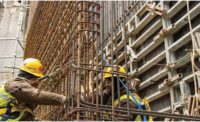A slew of skilled electricians exiting the project, the continuing need for reworking bad welds and the owner’s reported loss of confidence in the construction team are among the issues monitors say are hampering Georgia Power’s Vogtle nuclear expansion as it heads toward its first in-service deadline in November.
Altogether, the challenges could cause Vogtle Units 3 and 4 to miss their respective regulatory-approved completion targets by roughly “7 to 9 months or more,” according to Donald Grace, vice president at Vogtle Monitoring Group (VMG), an outside monitor.
Currently, problems making progress with the critical activity of hot functional testing (HFT) are causing the latest delays to the project’s schedule, according to testimony jointly submitted by the Steven Roetger of the Georgia Public Service Commission (PSC), and William Jacobs, the project’s independent construction monitor.
For example, the monitors’ testimony notes that HFT didn’t begin until April 25, “some 18 weeks after” Georgia Power’s forecast start date of December 2020—a delay caused “primarily by the late completion and turnover of plant systems required” for the system testing.
Notably, Roetger’s and Jacobs’ testimony further detailing the HFT issues was redacted to an unusually extensive degree. Overall, they testified that, “We believe that Unit 3 COD (Commercial Operation Date) will be significantly later than forecast.”
Rework, long a problem at Vogtle, continues to be an issue. The problem was highlighted in the monitors’ testimony regarding a problem with leaks in the spent fuel system’s fuel transfer canal (FTC) and spent fuel pool (SFP). The problem, which was recognized on March 16, caused Georgia Power to suspend deliveries of new fuel.
Resolution of the leaks, which is ongoing, will require weld areas that leaked or else showed “indication of poor weld quality” to be ground out and re-welded, said the monitors. Georgia Power reports that the effort to examine and make repairs to resolve the issue has so far added a cost of nearly $3.4 million.
On March 18—two days after the discovery of leaks—Southern Nuclear Co. held a sitewide stand-down. Testifying about the primary reason for the stand-down, Roetger and Jacobs stated: “SNC had lost confidence in Bechtel and their managed subcontractors’ ability to meet required quality standards. The stand-down was used to reinforce first-time quality behaviors.”
In response to ENR's inquiries about the overall rework and the stand-down, Georgia Power media representative Jeffery Wilson said: “Additional construction remediation work, primarily related to electrical installations, was necessary to ensure quality and design standards were met as system turnovers were completed prior to starting hot functional testing and fuel load for Unit 3.
“The site has worked through numerous start-up and operational-type issues including refinements to control system logic and plant chemistry,” Wilson continued. “The types of issues we are addressing during testing are not unexpected and are more related to operating systems together with temperature for the first time.”
Amanda Meixel Kinghorn, public affairs manager for Bechtel, told ENR that the company is in “lock step” with SNC, adding: “Vogtle Units 3 and 4 is a highly complex digital nuclear power plant requiring strict adherence to nuclear quality and safety standards at every step. Quality and safety will not be compromised as we complete the project.”
More Rework, Delays Ahead?
A workforce issue will likely cause more rework at Unit 4, the PSC monitors noted, reporting that roughly 50% of experienced electricians who were transferred from Unit 3 to Unit 4 “have chosen to leave the project.” As the project team seeks to replace these veterans, likely with craftworkers who have less nuclear experience, monitors surmise this situation "will in all likelihood create more rework.”
Grace, the VMG monitor who estimated a 7- to 9-month delay for each unit, also cited one of the primary factors contributing to the project’s delays is related to “planning the work with a focus on meeting major milestones versus a focus on completing more construction bulks and completing entire systems,” an issue he testified to previously.
Grace specified the routing of electrical cables as an example, noting that in order to meet a major schedule milestone, “SNC’s focus was, in many cases, to run single, or several, conductor cables versus doing bulk pulling of cable.”
Overall, Grace estimates that rather than in November, Unit 3 may achieve commercial operation between June and August 2022, or “even later.” Unit 4’s COD could come as late as June 2023, according to his testimony.





